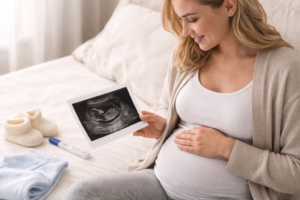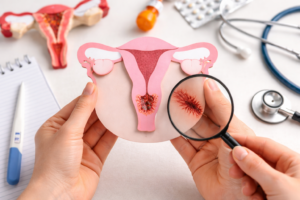If you’ve recently experienced implantation bleeding, you might be wondering when is the right time to take a pregnancy test. It is sometimes hard to distinguish whether the bleeding is a sign of pregnancy when it is light and confused. It’s easy to think it could be your period, but implantation bleeding is quite different. Knowing when to test is key to getting an accurate result, so let’s break it down step-by-step.
What is Implantation Bleeding?
After an egg is implanted, bleeding occurs as it attaches to the uterine lining. A broken blood vessel can cause light spotting or bleeding as a result of this process. This usually happens about 6-12 days after conception, making it one of the first signs that you might be pregnant. It typically lasts only a few hours to a couple of days, and the bleeding is often much lighter than a regular period.
However, not every woman will experience implantation bleeding, and its timing can vary. While implantation bleeding can be an early sign of pregnancy, it doesn’t always guarantee that you are pregnant. Now, let’s talk about how long after implantation bleeding you should wait before testing for pregnancy.
Timing Your Pregnancy Test After Implantation Bleeding
You’re probably wondering, how long after implantation bleeding can I test for pregnancy? The timing is crucial, as testing too early can lead to inaccurate results. Here are some important things to consider:
- Wait 3-4 Days After Implantation Bleeding
Pregnancy tests should be taken 3-4 days after bleeding ensues during implantation bleeding. This gives your body enough time to produce enough hCG (human chorionic gonadotropin), the pregnancy hormone, which is what pregnancy tests detect. Testing too early may result in a false negative, as the hormone levels may not be high enough to be detected. - Consider Your Menstrual Cycle
If you have a regular menstrual cycle, the ideal time to take a pregnancy test is after your missed period. For most women, implantation bleeding happens 6-12 days after ovulation, which can be close to the time when your period is due. If you’re unsure of your cycle, it’s best to wait 7-10 days after implantation bleeding to test. By this time, the pregnancy hormone should be at detectable levels.
Test Sensitivity
Not all pregnancy tests are created equal. Some tests are more sensitive than others and can detect lower levels of hCG in your urine. If you want to test earlier, consider using a high-sensitivity test. It is possible to detect pregnancy hormones sooner with these tests than with standard tests, but even a sensitive test can be inaccurate if not performed correctly.
Early Pregnancy Signs to Look For
Along with timing, it’s helpful to pay attention to other signs that could indicate pregnancy. These symptoms may start shortly after implantation bleeding:
- Missed Period: This is one of the most reliable signs of pregnancy, especially if you have a regular cycle.
- Morning Sickness: Nausea, especially in the morning, is common in early pregnancy due to hormonal changes.
- Tender Breasts: Changes in hormone levels can cause your breasts to feel sore, swollen, or tender to the touch.
- Fatigue: Feeling unusually tired is another early pregnancy symptom, as your body works harder to support the growing baby.
- Mood Swings: Emotional changes can also be caused by hormonal changes, resulting in mood swings and irritability.
It’s important to note that these symptoms can also occur in women who are not pregnant. However, if they accompany implantation bleeding and you suspect pregnancy, it’s worth taking a test after waiting the right amount of time.
Best Time to Take a Pregnancy Test
After implantation bleeding, here are the best times to perform the test for a more accurate result:
- 3-4 Days After Implantation: If you can’t wait until your missed period, consider testing at least 3-4 days after implantation bleeding. By this time, enough hCG will likely have built up in your body for a sensitive pregnancy test to detect.
- After a Missed Period: If you can wait a little longer, the best time to take a pregnancy test is after you’ve missed your period. The longer your body has to build up hCG, the more accurate the test results will be.
Using Pregnancy Tests Correctly
To ensure the most accurate results, here are some tips for using pregnancy tests:
- Use First Morning Urine: The first urine you have taken in the morning should be used for the test. This is when your urine is most concentrated and has the highest level of hCG, making it easier to detect.
- Follow the Instructions: Make sure you read and follow the instructions on the pregnancy test. If you wait too long to check the results, you may see an inaccurate reading.
Don’t Panic: If you take a test and get a negative result but still feel you might be pregnant, wait a few more days and retake the test. Hormone levels rise over time, so it’s possible to get a positive result later.
Factors That Can Affect Your Test Results
There are a few factors that can influence the accuracy of a pregnancy test:
- Drinking Too Much Water: If you drink too much water before taking the test, it can dilute your urine, which can affect the test’s ability to detect hCG.
- Taking the Test Too Early: Testing too soon after implantation bleeding can lead to a false negative because your body hasn’t produced enough hCG yet.
- Expired Tests: Make sure the test is within its expiration date. An expired test can give incorrect results.
Final Thoughts
The best time to take a pregnancy test after implantation bleeding is at least 3-4 days after the bleeding stops, but it’s even better to wait until after you miss your period for the most accurate results.
Pregnancy tests are generally reliable, but timing is everything. The longer you wait after implantation bleeding, the more likely you are to get an accurate result. If you’re unsure, or if your results remain unclear, consult a healthcare provider who can offer guidance and confirm your pregnancy with a blood test.
Remember, your body may take time to adjust, so be patient and take the test when the time is right.









 No need to worry, your data is 100% Safe with us!
No need to worry, your data is 100% Safe with us!
1 thought on “How Long After Implantation Bleeding Can I Test for Pregnancy?”
🎬 Save videos fast with download YouTube — paste the link to grab MP4/MP3 in HD–4K (when available), no login or install needed, smooth on mobile & desktop ⚡⬇️